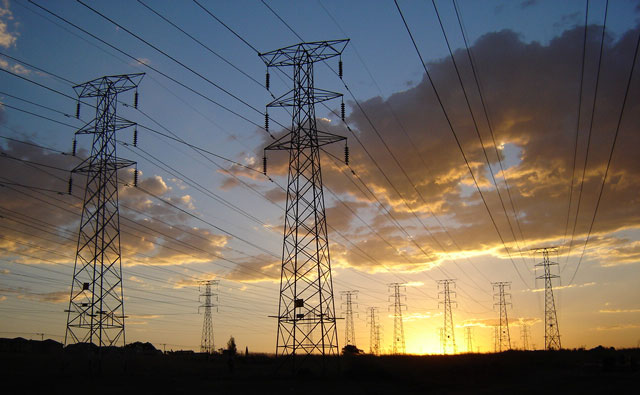
Eskom on Monday morning announced that the Medupi power station’s first unit will not come online by December 2013 as planned, with the more realistic deadline being the second half of 2014. This set the deadline of the whole project back by six months to a year.
The delay was announced despite a warning by public enterprises minister Malusi Gigaba in April that service providers would face tough penalties if Medupi did not meet its December 2013 deadline and that “heads would roll” if the project was pushed back.
Eskom CEO Brian Dames, flanked by the company’s financial director and head of group capital, Paul O’Flaherty, explained there are three “critical challenges” which have hampered progress in the completion of the first unit at the mammoth power project.
Eskom made it clear the contractors were at fault. “In our view, the ability of our contractors to supervise and manage the labour is extremely poor across the board, and not one of them will dispute that issue,” O’Flaherty said. “Despite what you are hearing today, there is significant effort going on on-site.”
The Limpopo project will comprise six units each with a capacity of 800MW units aimed at contributing toward a stable electricity supply — crucial for stimulating economic growth. Unit six was intended to deliver first power to the grid by end-2013. Its failure to do so will result in an estimated gap of 700MW, which Eskom will have to find elsewhere.
The delay will also cause project costs to increase from R91,2bn to R105bn — although this will not affect tariffs as public enterprises intends to claw back some of these expenses through claims against contractors that have contributed to the problem.
So what went wrong with the project?
Control and instrumentation:
Perhaps the most pressing issue for Medupi’s timeline is the control and instrumentation issues, and it is the schedule on this component that indicates the December 2013 date cannot be achieved.
The C&I systems, as it is known, is the brains behind the power station. It is the operating system that is used to monitor and control the plant.
Eskom said there has been “continued underperformance on the control and instrumentation contract, despite active interventions by Eskom over the past year”.
“The system has failed factory acceptance tests; one further test failed in June 2013. But Eskom continues to work with the contractor to resolve defects by July 2013,” the state-owned entity said, although it noted delays would still be expected beyond 2013.
Eskom said it engaged with the global leadership of Hitachi and Alstom to resolve the technical issues on the boiler and control and instrumentation contracts, respectively, and has put significant skills and resources in place to ensure performance.
The power utility noted it was looking at alternatives should contractors be unable to deliver.
Boiler welding:
As far as the boiler welding is concerned, Eskom said there has been inadequate post-weld heat treatment, meaning multiple welds needed to be retested and fixed. And welds made using unqualified procedures also needed to be replaced.
O’Flaherty said there were about a thousand welds that would be cut and repaired or heat-treated, and would require “significant work”.
This problem is also causing concurrent delays with the electrical system and creates a complication of access, he said. Eskom said it was closely monitoring and tracking progress on-site.
Labour:
Eskom said significant progress had been made in its labour relations and even a new partnering agreement (which sets the basis for an effective partnership, bringing improved stability and productivity) has been signed. Labour is critical to the success of the project, but the site has a lengthy history of unrest and the project has lost up to nine months in days of production due to strike action.
Most recently, there was a work stoppage of more than three months — from January to April 2013 — which contributed to putting the December deadline at risk.
But the company said significant progress was made in restoring effective labour relations on-site and processes were developed to address all grievances. Salary discrepancies were also being removed.
Eskom has committed to taking the bull by the horns and said it is now driving the management, development and supervision of the project, which it says is actually not its responsibility. O’Flaherty said that without the power utility leading, “we are just not going to get the job done”. — (c) 2013 Mail & Guardian
- Visit the Mail & Guardian Online, the smart news source

